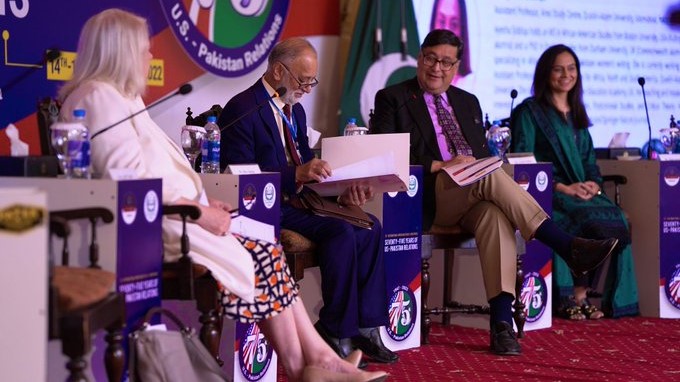Najam Discusses U.S.-Pakistan Relations at International American Studies Conference

On September 15, 2022, Adil Najam, Dean Emeritus and Professor of International Relations and Earth and Environment at Boston University’s Frederick S. Pardee School of Global Studies, spoke at the 16th International American Studies Conference organized by the Area Studies Center for Africa, North and South America at the Quiad-i-Azam University and the United States Embassy in Pakistan.
This year’s conference, themed “Seventy-Five Years of US-Pakistan Relations,” brought together some of the leading scholars and practitioners of U.S.-Pakistan foreign relations, including the U.S. Ambassador in Pakistan; Pakistan’s Minister of State for Economic Affairs; Elizabeth Threlkeld, Senior Fellow and Director South Asia at the Stimson Center; Michael Kugelman, Head of South Asia Program at the Wilson Center; Dr Maleeha Lodhi, former Pakistan Ambassador to the U.S., United Kingdon, and United Nations; and many more.
Najam spoke on a panel discussing U.S.-Pakistan relations, development, health, and the environment. Chaired by Professor Ijaz Shafi Gillani, Senior Fellow at the NUST Institute of Policy Studies and CEO of Gallup Pakistan, Najam’s panel also featured Dr. Rita Akhtar, Executive Director of the USEFP; and Dr. Ayesha Siddiqa, Assistant Professor at Quaid-i-Azam University’s Area Study Centre.
Najam argued that the essential landscape of U.S.-Pakistan relations has fundamentally changed over the last two decades; however, policy elites and ‘managers’ of this relationship are still caught in a now-outdated model of what the relationship is about and how it operates. He says that two fundamental realities of this changed context on the Pakistan side are the demographic context of youth in Pakistan and the ecological context of climate change. Najam’s research talk was predicated on the proposition that “before we can ever see a shift in U.S.-Pakistan relations we will first have to see a shift in how we think about (imagine) U.S.-Pakistan relations.”
For more details, visit the International American Studies Conference website.
Adil Najam is a global public policy expert who served as the Inaugural Dean of the Frederick S. Pardee School of Global Studies at Boston University and was the former Vice-Chancellor of the Lahore University of Management Sciences (LUMS). His research focuses on issues of global public policy, especially those related to global climate change, South Asia, Muslim countries, environment and development, and human development. Read more about Najam on his faculty profile.